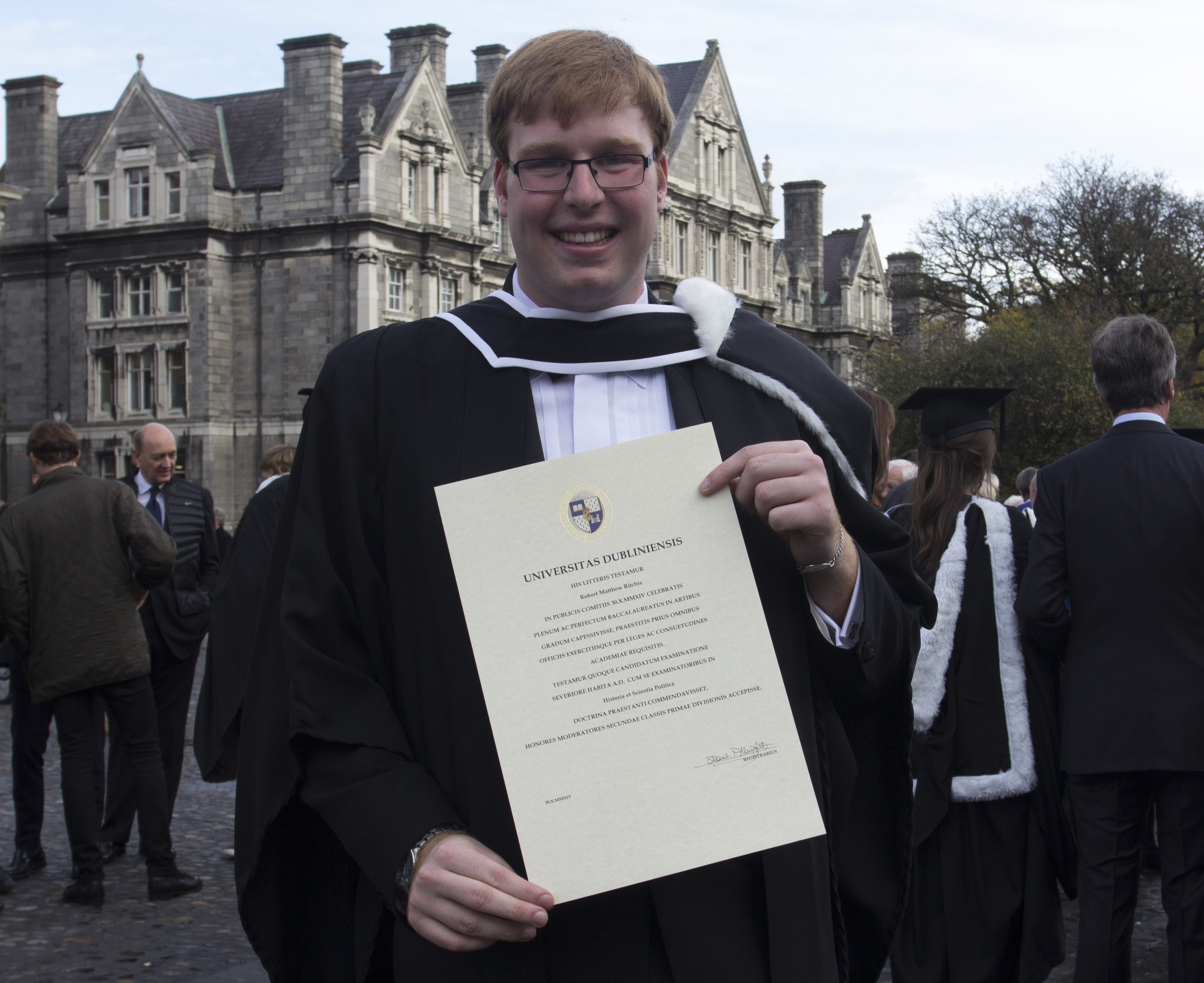
Handing in her dissertation was another particularly rewarding experience. “That newly bound book represented countless hours of reading, examination, interpretation, toil, tears, revelation and writing,” she recalls. It “was my one ring and I had just dropped it into the flaming pits of Mount Doom.” She is uncertain but optimistic about the future. “I hope to find a career path that I love and if that means having to search around for a while first, then that is very well what I may be doing in a few years: searching. Come back to me then and I’ll tell you what I have found.”
One of the things that meant most to Matt Ritchie, a history and political science graduate, were the other students. “My year were really great people and we were all very close, which made just about every part of my four years better,” he says. “Whether it was group studying or grabbing a bite to eat between classes, there was always somebody around looking for company.” He speaks fondly about his role in society life, and in particular his involvement with the College Historical Society (Hist), which offered him many opportunities, from debates and listening to famous guests to trips and competitions around Ireland. “The free beer and wine at the weekly receptions certainly didn’t hurt either,” he adds.
Now back home in Canada, Matt is living in Ottawa and doing a master’s degree in public and international affairs. As for his plans for the future, he says, “After the next two years, the dream is to land a job with the Canadian civil service, hopefully something abroad. I’d love to get a chance to make my way back to Europe, maybe even back to Ireland, at some stage.”
Opportunities
For law and business graduate, Hannah McCarthy, Trinity was “exciting, terrifying and exhausting” and created “an environment where you can take risks and play with ideas.” Asked about some of the defining moments of her early days in Trinity, she says her first Hist speech in the “photogenic, but not particularly hospitable” Exam Hall comes to mind. The motion was ‘That this House believes the modern Irish woman has no need for a women’s movement’ and former president of Ireland, Mary Robinson, was chairing the debate. Contacted by the committee the night before the event, she says she was “a last ditch attempt to get a woman speaking for the motion.” She “can still remember the nerves; the mixture of excitement and terror, as I realised what I’d agreed to.”
Hannah is currently working in Washington DC for a US senators. Her years in Trinity, she tells me, were largely responsible for getting her to where she is now. “I’m not sure I would have been bold or imaginative enough to have attempted to get work like that without Trinity and all the friends I made there as my springboard.”
Challenges
Ailbhe Nic Cába, who studied modern Irish and history, recalls entering Front Arch on her first day of college in September 2010 “excited” about her achievement and “the prospect of what lay ahead for the next four years.” However, Trinity proved “a very lonely place” at times despite having had many friends, though the “highly competitive atmosphere” went on to act “as a catalyst to spur me on further.”
Having just gone through the graduation process, she expresses several reservations about the way Trinity conducts its commencement ceremonies. “Trinity certainly conveys how proud they are of student academic achievement through formality, rather than words, which, when compared to the ceremonies of other universities, comes across as rather emotionless,” she says. She also criticises the seating of students according to grade during the ceremony as “completely unnecessary,” leaving some students “with a strong feeling of inferiority on what should be a day they feel most proud of their degree from such a prestigious university, regardless of their final result.” Ailbhe plans now to continue her studies with a master’s degree in communications in Acadamh na hOllscolaíochta Gaeilge at NUIG.
Memories
Morgan Macintyre, a former history and political science student, says the graduation day has been a nostalgic occasion. “I will always remember fondly my days working in the JCR with all of my friends,” she says. “The cafe became a safe haven for me in college, a place where I could seek refuge.”
Among the other highpoints of her time at Trinity, she recalled her last year when her younger sister joined her in the college, as well as the 2013 and 2014 Trinity Ball, at which she had the pleasure of performing.
She hopes now to focus on playing music and writing songs. “After four years in college I feel that I owe it to myself to explore music as a possible career,” she said, adding that if it doesn’t work out she will always have her degree to fall back on. “I’m not in any rush to settle down into a ‘proper job’. At 22, we’ve all got years ahead of us to try out any number of careers or passions.”















